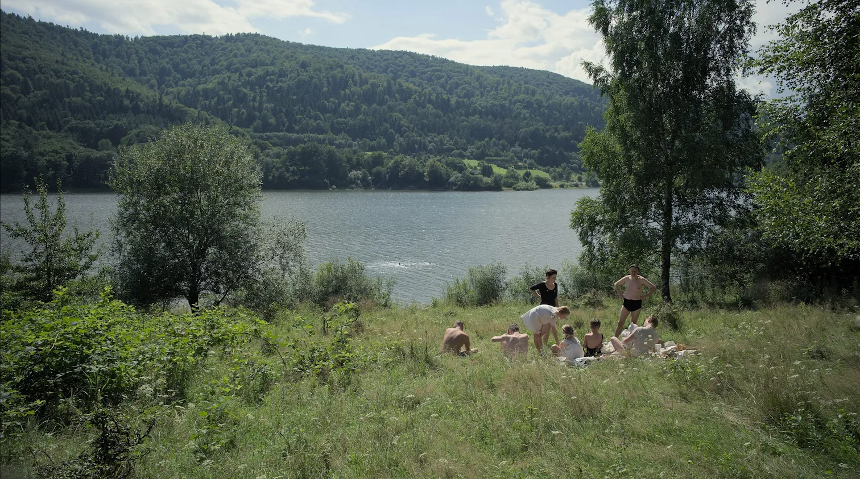Cannes 2023 Review: THE ZONE OF INTEREST, Jonathan Glazer's Oblique Holocaust Drama
Sandra Hüller and Christian Friedel star in a German-language film, directed by Jonathan Glazer.

'How could the Germans have done it?'
It's a question often contemplated in works dealing with the Holocaust. It isn’t so much an interjection as a legitimate inquiry that some writers/filmmakers seek to make. Claude Lanzmann, in his monumental Shoah, gave us the bureaucratic answer: defining at length the logistics of how it happened.
British filmmaker Jonathan Glazer now offers up a physiological response: the mental compartmentalization needed to completely sidestep and ignore a soul-shattering nightmare happening in your vicinity.
The Zone of Interest is being advertised as an adaptation of Martin Amis’ eponymous novel but has little to do with it. In fact, it does not have any plot or story as such. The film primarily tracks the daily life of a real historical figure, SS commandant Rudolf Höss (Christian Friedel). He lives at the Auschwitz death camp in domestic bliss with his wife Hedwig (Sandra Hüller) and their young kids. You’d wonder who would want to live in a place like Auschwitz. It wouldn’t be the place for even a Nazi family to raise young kids, would it?
Clearly, the Nazis felt otherwise. At one point when Rudolf informs Hedwig that he’s being transferred to another concentration camp, she is distraught that she has to give up her happy and fulfilling life in the Auschwitz death camp. You see, she has built her ideal home -- an idyllic, sylvan paradise -- right within the walls of Auschwitz. Their property has an enormous garden, green meadows, farming beds for fruits and vegetables, a greenhouse, and a swimming pool to entertain the kids. Any unseemly sights, like the systematic murder of Jews, are kept away by high walls.
This is where Glazer’s unusual, novel approach to the subject matter finds its most striking expression. The Holocaust is heard but not seen in The Zone Of Interest. In fact, all the images you are expecting to see, such as piles of suitcases, shoes and teeth, gas chambers, mounds of corpses, emaciated prisoners in prison garbs, barbed wire, and so forth, are entirely absent. This marks a bold choice that sets the film apart from other acclaimed Oscar-winning Holocaust films like Steven Spielberg's Schindler's List, Roman Polanski's The Pianist, and László Nemes's Son of Saul.
There is a question of responsibility in depicting certain images on screen. Michael Haneke famously had the most violent acts in Funny Games occur off camera, denying audience members any visceral thrill or catharsis they might be seeking. Ditto last year’s Till, where director Chinonye Chukwu did not show the show the lynching and torture of a Black child on camera. The argument went that you cannot countenance such acts by depicting them for the audience’s entertainment.
Glazer seems to subscribe to that principle as well; his film scrupulously avoids any images of human degradation or violence heinously visited upon a minority. This approach lends the film its bracing, discomfiting atmosphere. The audience knows that beyond the edge of the frame of this beautiful Germanic home, mere feet away, the greatest, most distressing crime against humanity is being committed.
The Zone of Interest achieves this through modest means. For the majority of the film, we stay within the walls of the Höss home and garden. The sound design does a lot of the heavy lifting, as the high walls around their home can block out the horrors of the Holocaust, but it cannot shield the family from the wails of human distress. It is with fascination we watch the domestic life of the Höss family play out on screen with not a care in the world. Children play and teenagers fall in love, there are birthday parties and visits from friends and family. The monsters among us don’t have horns or scales, Glazer tells us.
The single setting of the film is created through excellent set design and photographed in sharp, bright images by cinematographer Łukasz Żal, of Ida and Cold War fame. Mica Levi’s dissonant score acts as a punctuation point in the beginning and at the end and at key points during the film.
Away from the images of domesticity on screen, Glazer offers up two different interludes that intrigue the audience. One is inverted footage overlaid upon black and white imagery that shows a young girl trying to help the starving prisoners in Auschwitz by hiding fruits for them in the forest. The second is a smash cut to footage the audience isn’t expecting to see but which helps drive home the weight of what’s at stake.
Michael Haneke notoriously slammed both Schindler's List and Downfall as kitsch and irresponsible in their depiction of the Holocaust. One feels, if he were to see Jonathan Glazer’s The Zone Of Interest, he would approve of it.
The Zone of Interest premiered at the 2023 Cannes Film Festival and will be released domestically by A24.

Do you feel this content is inappropriate or infringes upon your rights? Click here to report it, or see our DMCA policy.






